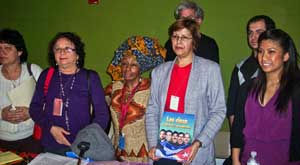WIDF assesses global conditions of women workers
By
Sue Davis
New York
Published Mar 19, 2010 8:01 PM
The Women’s International Democratic Federation held a panel discussion
on “The Economic Crisis and Women’s Access to Work” at the
United Nations on March 10 as part of the 15th anniversary of the Beijing World
Conference on Women. Dr. Vinie Burrows, permanent representative to the U.N.
for the WIDF, asked the panelists to talk about “how the global economic
crisis has fallen the hardest on women.” Berta Joubert-Ceci of the
National Women’s Fightback Network of WIDF helped organize the event.
|
Maritzel González-Quevido holds picture of
Cuban Five political
prisoners at discussion
of women’s status at UN.
WW photo: John Catalinotto
|
Ana Violeta Castaneda, WIDF regional coordinator for Latin America and the
Caribbean, noted that advancements for women have been limited since Beijing
because many repressive governments in the region spend valuable resources on
the military, while the vast majority of the people live in poverty.
Valerie Francisco, representing GABRIELA USA, said that employment for women in
the Philippines has worsened since the Gloria Macapagal-Arroyo administration
took power nine years ago. As a result, Filipino women are migrant workers in
145 countries, most often as low-paid domestic servants with no rights. She
invited women to attend a GABRIELA conference in August in Montreal to prepare
a women’s platform of action.
Liege Rocha, a member of the steering committee of WIDF in Brazil, reported
that the impact of the capitalist crisis was not that heavy in Brazil, though
there was some increase in unemployment. While 47 percent of women work (90
percent in service industries), they earn 30 percent less than men. “One
of our achievements is establishing the Women’s Department, where women
decide on policies for women. We need to take action to end women’s
inequality and to be economically independent,” she said.
Pham Hoai Giang, the head of international relations for the Vietnam
Women’s Union, prepared a statement read by U.S. activist Merle Ratner.
The VWU, established in 1930, is currently fighting trafficking of women and
domestic violence and is dealing with the continuing effects of Agent Orange.
Giang noted that the impact of the capitalist crisis has not been as severe as
in other countries because of government policies devoted to relieving
poverty.
Maritzel González-Quevido of the Federation of Cuban Women spoke about how
Cuba has been actively implementing key policies adopted at the Beijing
conference as part of its overall program to end oppression based on class,
gender and race. González reported that women predominate in many job
categories — for example, they are 70 percent of health care workers and
attorneys.
Invited guest Tiago Vieira, president of the World Federation of Democratic
Youth, announced the World Youth Festival that his organization is holding in
December 2010 in Johannesburg, South Africa.
Articles copyright 1995-2012 Workers World.
Verbatim copying and distribution of this entire article is permitted in any medium without royalty provided this notice is preserved.
Workers World, 55 W. 17 St., NY, NY 10011
Email:
[email protected]
Subscribe
[email protected]
Support independent news
DONATE


